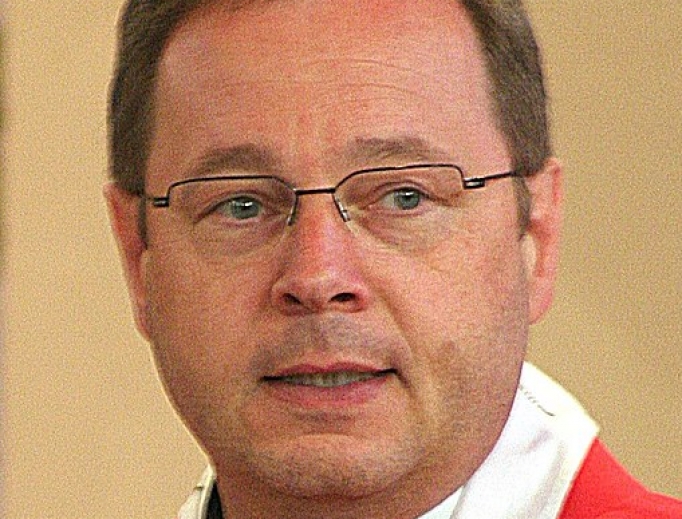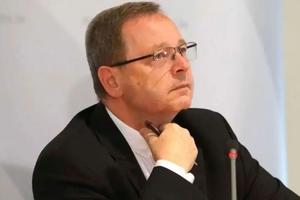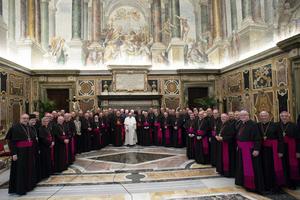Germany’s Synodal Way Takes a Boring Route
COMMENTARY: The synodal path is merely a symptom of a bigger problem: The Church is dealing with de facto atheists who believe in secular modernity more than they believe in the Christ of the Church.

A lot of ink has been spilled lately on the German Synodal Way — and rightly so. After all, it isn’t every day that one sees an entire episcopal conference face-palm the Vatican and insist that it is going to move forward with its “reforms,” no matter which Roman dicastery tells them to stop.
In their recent ad limina visit to the Vatican, the German bishops spoke as if the Synodal Path is irreversible and has reached conclusions that are irrevocable as far as they are concerned, putting the Church in Germany on a collision course with Rome, not to mention traditional Catholic teachings on sexual morality, women’s ordination and the blessing of same-sex unions. However, Bishop Georg Bätzing, head of the German episcopal conference, threw cold water on the notion that a schism is looming and stated, “We are Catholics, and we will remain Catholics, but we want to be Catholic in a different way.”
Well, then, there you have it: All of this hullabaloo is just a minor misunderstanding since the Germans desire nothing more than to be a bit “different” from the rest of the universal Church. The problem is that the differences of which Bishop Bätzing speaks are not superficial and are not mere matters of local taste. But Bishop Bätzing knows this, and his downplaying of the crisis at hand as a dispute over a few “differences” is a deflection meant to redirect attention away from the possibility of schism, whatever form that may take.
But these are just the bare-boned facts of the situation, and many commentators have already discussed all of these issues in great detail. It seems to me that the elephant in the living room, which very few are discussing, is the current condition not of the Catholic Church in Germany, but of the Protestant. Everyone agrees that the Catholic Church in Germany is hemorrhaging members (especially among the young) and that this process shows no signs of slowing down. Indeed, it seems to be accelerating. But the same process has happened in the German Protestant churches, as well, and to an even greater extent. There are around 20 million Protestants in the EKD (an acronym for the Evangelical Church in Germany), and yet only about 1 million are regularly active participants.
Why is this important? Because the fact of Protestant decline in Germany calls into question the logic of the German Synodal Way, which has been described by leading German bishops as a process designed to introduce liberalizing reforms in Church doctrine and practice and which they have stated are absolutely necessary if the Church in Germany is to have any hope of reversing its terminal decline into demographic irrelevance.
But this logic is contradicted when one notes that the various Protestant churches have already introduced most of these same reforms, to little effect. They already ordain women and have women bishops, have a married clergy, bless same-sex unions, allow for contraception, turn a blind eye to premarital sex, allow for intercommunion with one another, are decentralized (synodal!) in their organizational structure, and hold that abortion, though not morally ideal, should remain broadly legal. They have held these views for many years now, and yet, shockingly, they, too, are in a free fall.
You would think that Bishop Bätzing, Cardinal Reinhard Marx and the other German prelates would know this. They would have to be monumentally obtuse not to. And yet Bishop Bätzing, in an attempt to justify the radical changes in Church teaching proposed by the Synodal Way, stated Nov. 15 in Rome, “It hits me personally hard that so many people are leaving the Church. In doing so, they are casting a vote and showing me that they no longer agree with the way the Church presents itself. The reasons are certainly varied and, for the most part, justified.”
You can back engineer the logic of that statement in order to ascertain that in the mind of the German episcopacy the reasons why Catholics are running away from the Church is that the Church is on the wrong side of history on a whole range of issues near and dear to secular liberals. And the German bishops agree that the Church is wrong on these issues, which is why Bishop Bätzing calls the concerns of those who are leaving “justified.”
But no mention is made by Bishop Bätzing of the Protestant decline in members, in even greater numbers. There is a control in this grand ecclesial experiment in modernization, and that control is Protestant Germany, which has long since adopted the changes in doctrine and discipline so longed for by Bishop Bätzing and the other German bishops. And those changes have not helped the Protestants in the slightest. If anything, those changes have coincided with an increased decline.
Therefore, it is of critical importance, as the number of the religious “nones” grows by the millions every year, that we diagnose the true nature of the crisis so that our evangelization can understand its audience properly. And that crisis has not been caused by the Church’s countercultural views on various hot-button issues. It is rather a much deeper crisis of faith in the basic supernatural message of Christianity. It is, in other words, a crisis of a de facto atheism caused by the very cultural air we breathe in the West.
The example of liberal Protestantism in Germany (and elsewhere) demonstrates that the crisis is not one of disagreements over the penultimate issues of sex and gender, but, rather, a crisis caused by a far deeper existential disbelief in anything supernatural and, most certainly, a disbelief in any “special” revelation that seems to many with this secular worldview to be hopelessly “exclusionary.”
Anyone who is involved in any way with ministry these days knows very well the crisis of which I speak. It is a crisis of apathy in the “God question” at all — and most certainly a crisis of an utter indifference to things religious. And this crisis may seem very recent, but it isn’t. It has been generations in the making, with the trend over the past century unfolding as a slow march toward secularization, with each succeeding generation being less religious than the one preceding it.
But it is precisely this culture of latently atheistic modern secularity that the Germans want to double down on. This is truly insane and monumentally naïve, and therefore its prescription for “reform” will be as useless as a defibrillator in a morgue.
In contrast to those churches that are in decline, the greatest vitality in the Church today is in those outposts of faith that propose a provocative and, dare I say, even “weird,” countercultural witness. Whether that be in traditional Latin Mass communities, or among “back-to-the-land” Catholics such as myself, or in more mainstream parishes that are flourishing, the common denominator is the same: What “works” is not accommodation to secularism but rather the development of intentional communities of deep faith that believe what the Church teaches and which have seen through the toxic lies and illusions of the dominant culture.
At the beginning of his magnificent novel The Diary of a Country Priest, the French-Catholic author George Bernanos introduces us to the young Curé of Abricourt who says:
“My parish is bored stiff; no other word for it. Like so many others! We can see them being eaten up by boredom, and we can’t do anything about it.”
This is a profound spiritual diagnosis from a master of the topography of the human spiritual quest, and it stands in sharp distinction to the endless superficial bromides of the progressive German blather about the need for “radical inclusion.” Because the kind of inclusion they are speaking of is boring, and it is boring because it is ultimately meaningless.
Who and what are to be “radically included”? Racists? Climate-change deniers? White supremacists? Latin Massgoers? Obviously not, which means the use of the word “inclusion” is just code for baptizing the sex-and-gender revolution of secular modernity, all the while autocratically “excluding” anyone who is not on the “LGBTQ” welcome wagon. By contrast, the Church is already radically and universally inclusive. It turns away not a single soul willing to give the sanctity thing a go.
Finally, this, then, is for me the greatest indictment of the German Synodal Way: It is boring. And because it is boring, it is ugly and unattractive. Forget the challenge it poses to Catholic doctrine for a minute. Put those concerns in brackets. They are important, but not the deeper problem. They are symptoms of the problem. The problem is we are dealing with de facto atheists who believe in secular modernity more than they believe in the Christ of the Catholic Church. How dull.
As the late, great theologian David L. Schindler once said to me, after falling asleep during a very dry lecture at a theology conference we were both attending, “nothing this boring can be true.”
Indeed.

















